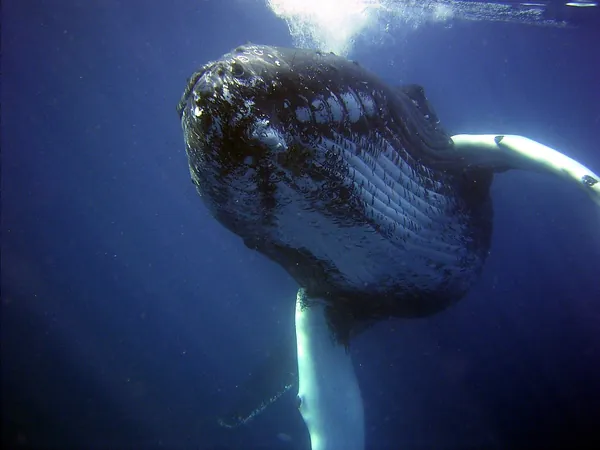
Baby Humpback Whales Speak to Their Mothers: Groundbreaking Insights into Maternal Communication!
2024-12-18
Author: Arjun
Baby Humpback Whales Speak to Their Mothers: Groundbreaking Insights into Maternal Communication!
A remarkable study by marine biologists and cetologists from Université Paris-Saclay, Université d'Antananarivo, and Ambodiforaha Sainte Marie has unveiled the fascinating vocal behaviors of baby humpback whales as they interact with their mothers. This research, published in the esteemed journal *Proceedings of the Royal Society B: Biological Sciences*, offers a deeper understanding of these complex marine mammals and their communication methods.
In this innovative study, researchers affixed multi-sensor, camera-equipped tags to several baby humpback whales living off the picturesque coast of Sainte Marie Island. Following their observations, they analyzed an impressive 33 hours of audio and visual data to explore how these young whales vocalize in various contexts, including during nursing, play, and rest.
Humpback whales are known for their rich vocal interactions, typically described as songs characterized by a series of repetitive, fluctuating sounds. Previous studies largely focused on adult whale communications. However, this team shifted the spotlight to the calves, diving into the intricate ways they communicate their needs and emotions to their mothers.
The analysis revealed intriguing patterns. The researchers discovered that baby whales created distinct sounds—ranging from low-frequency calls to snorts, barks, and even what could be described as "burps." These vocalizations were notably more abundant in the mornings when the calves were preparing for nursing, suggesting a strong link between these sounds and their feeding behavior. Markedly, the periods of vocalization were longer than during other activities, indicating that these calls might serve as a form of begging for food.
Additionally, the study highlighted the circumstances under which the calves were quiet versus vocal. The young whales were primarily silent during downtimes, such as traveling, but exhibited energetic and loud calls when playing on the surface of the water.
This groundbreaking research serves to enrich our understanding of how young humpback whales express themselves and maintain their vital bond with their mothers. It raises exciting questions about the social dynamics within whale pods and how communication evolves as these calves grow.
As we continue to explore the oceans, studies like these remind us of the intricate and often mysterious lives of marine animals—inviting us to further protect their habitats and understand their essential roles in the ecosystem. Stay tuned for more incredible discoveries from the depths of our oceans!



 Brasil (PT)
Brasil (PT)
 Canada (EN)
Canada (EN)
 Chile (ES)
Chile (ES)
 España (ES)
España (ES)
 France (FR)
France (FR)
 Hong Kong (EN)
Hong Kong (EN)
 Italia (IT)
Italia (IT)
 日本 (JA)
日本 (JA)
 Magyarország (HU)
Magyarország (HU)
 Norge (NO)
Norge (NO)
 Polska (PL)
Polska (PL)
 Schweiz (DE)
Schweiz (DE)
 Singapore (EN)
Singapore (EN)
 Sverige (SV)
Sverige (SV)
 Suomi (FI)
Suomi (FI)
 Türkiye (TR)
Türkiye (TR)